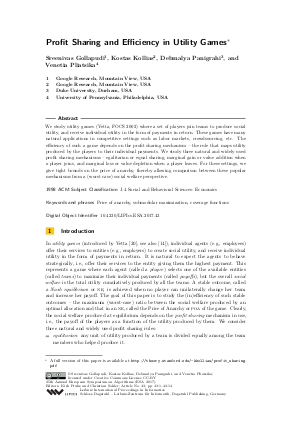Profit Sharing and Efficiency in Utility Games
Authors Sreenivas Gollapudi, Kostas Kollias, Debmalya Panigrahi, Venetia Pliatsika
-
Part of:
Volume:
25th Annual European Symposium on Algorithms (ESA 2017)
Part of: Series: Leibniz International Proceedings in Informatics (LIPIcs)
Part of: Conference: European Symposium on Algorithms (ESA) - License:
 Creative Commons Attribution 3.0 Unported license
Creative Commons Attribution 3.0 Unported license
- Publication Date: 2017-09-01
File

PDF
LIPIcs.ESA.2017.43.pdf
- Filesize: 478 kB
- 14 pages
Document Identifiers
Subject Classification
Keywords
- Price of anarchy
- submodular maximization
- coverage functions
Metrics
- Access Statistics
-
Total Accesses (updated on a weekly basis)
0PDF Downloads0Metadata Views
Abstract
We study utility games (Vetta, FOCS 2002) where a set of players join teams to produce social utility, and receive individual utility in the form of payments in return. These games have many natural applications in competitive settings such as labor markets, crowdsourcing, etc. The efficiency of such a game depends on the profit sharing mechanism - the rule that maps utility produced by the players to their individual payments. We study three natural and widely used profit sharing mechanisms - egalitarian or equal sharing, marginal gain or value addition when a player joins, and marginal loss or value depletion when a player leaves. For these settings, we give tight bounds on the price of anarchy, thereby allowing comparison between these popular mechanisms from a (worst case) social welfare perspective.
Cite As Get BibTex
Sreenivas Gollapudi, Kostas Kollias, Debmalya Panigrahi, and Venetia Pliatsika. Profit Sharing and Efficiency in Utility Games. In 25th Annual European Symposium on Algorithms (ESA 2017). Leibniz International Proceedings in Informatics (LIPIcs), Volume 87, pp. 43:1-43:14, Schloss Dagstuhl – Leibniz-Zentrum für Informatik (2017)
https://doi.org/10.4230/LIPIcs.ESA.2017.43
BibTex
@InProceedings{gollapudi_et_al:LIPIcs.ESA.2017.43,
author = {Gollapudi, Sreenivas and Kollias, Kostas and Panigrahi, Debmalya and Pliatsika, Venetia},
title = {{Profit Sharing and Efficiency in Utility Games}},
booktitle = {25th Annual European Symposium on Algorithms (ESA 2017)},
pages = {43:1--43:14},
series = {Leibniz International Proceedings in Informatics (LIPIcs)},
ISBN = {978-3-95977-049-1},
ISSN = {1868-8969},
year = {2017},
volume = {87},
editor = {Pruhs, Kirk and Sohler, Christian},
publisher = {Schloss Dagstuhl -- Leibniz-Zentrum f{\"u}r Informatik},
address = {Dagstuhl, Germany},
URL = {https://drops.dagstuhl.de/entities/document/10.4230/LIPIcs.ESA.2017.43},
URN = {urn:nbn:de:0030-drops-78329},
doi = {10.4230/LIPIcs.ESA.2017.43},
annote = {Keywords: Price of anarchy, submodular maximization, coverage functions}
}
Author Details
References
-
Y. Bachrach, V. Syrgkanis, and M. Vojnovic. Incentives and efficiency in uncertain collaborative environments. In WINE, pages 26-39, 2013.

-
G. Calinescu, C. Chekuri, M. Pal, and J. Vondrak. Maximizing a submodular set function subject to a matroid constraint (extended abstract). In IPCO, pages 182-196, 2007.

-
H. Chen, T. Roughgarden, and G. Valiant. Designing network protocols for good equilibria. SIAM Journal on Computing, 39(5):1799-1832, 2010.

-
S. Dobzinski and M. Schapira. An improved approximation algorithm for combinatorial auctions with submodular bidders. In SODA, pages 1064-1073, 2006.

-
Y. Filmus and J. Ward. The Power of Local Search: Maximum Coverage over a Matroid. In STACS, pages 601-612, 2012.

-
Y. Filmus and J. Ward. Monotone submodular maximization over a matroid via non-oblivious local search. SIAM Journal on Computing, 43(2):514-542, 2014.

-
M. Gairing. Covering games: Approximation through non-cooperation. In WINE, pages 184-195, 2009.

-
V. Gkatzelis, K. Kollias, and T. Roughgarden. Optimal cost-sharing in weighted congestion games. In WINE, 2014.

-
T. Harks and K. Miller. The worst-case efficiency of cost sharing methods in resource allocation games. Operations Research, 59(6):1491-1503, 2011.

-
E. Kalai and D. Samet. On weighted Shapley values. International Journal of Game Theory, 16(3):205-222, 1987.

-
S. Khot, R. J. Lipton, E. Markakis, and A. Mehta. Inapproximability results for combinatorial auctions with submodular utility functions. Algorithmica, 52(1):3-18, 2008.

-
K. Kollias and T. Roughgarden. Restoring pure equilibria to weighted congestion games. In ICALP, 2011.

-
J. R. Marden and T. Roughgarden. Generalized efficiency bounds in distributed resource allocation. In CDC, pages 2233-2238. IEEE, 2010.

-
J. R. Marden and A. Wierman. Distributed welfare games. Operations Research, 61(1):155-168, 2013.

-
D. Monderer and L. S. Shapley. Potential games. Games and Economic Behavior, 14(1):124-143, 1996.

-
I. Post, M. Kapralov, and J. Vondrak. Online submodular welfare maximization: Greedy is optimal. In SODA, pages 1216-1225, 2013.

-
R. W. Rosenthal. A class of games possessing pure-strategy Nash equilibria. International Journal of Game Theory, 2(1):65-67, 1973.

-
T. Roughgarden. Intrinsic robustness of the price of anarchy. In STOC, pages 513-522, 2009.

-
L. S. Shapley. Additive and Non-Additive Set Functions. PhD thesis, Department of Mathematics, Princeton University, 1953.

-
A. Vetta. Nash equilibria in competitive societies, with applications to facility location, traffic routing and auctions. In FOCS, 2002.

